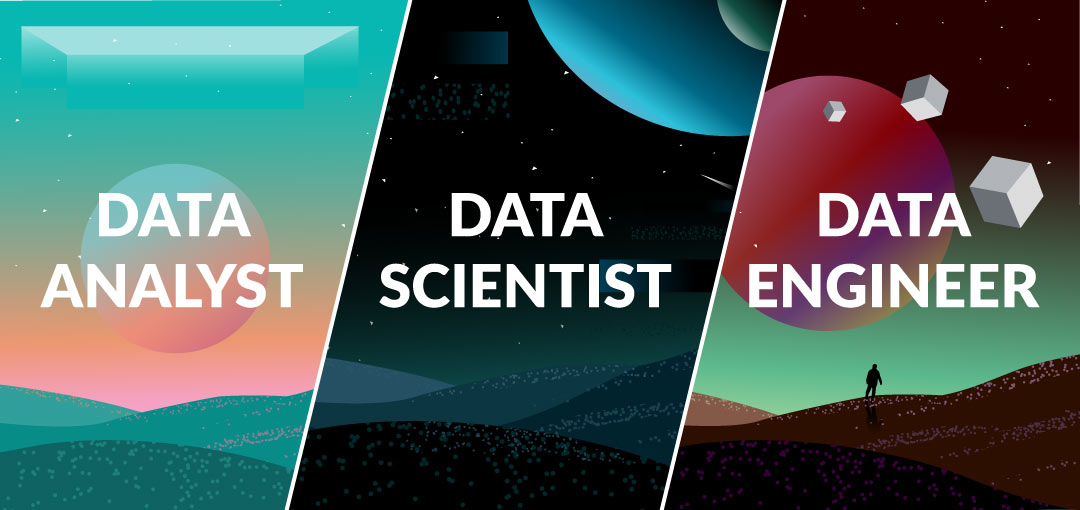CAREER GROWTH
DATA ANALYST VS DATA SCIENTIST VS DATA ENGINEER
JUNE 23, 2020

Three leading roles in data management are Data Analyst, Data Scientist, and Data Engineer. Here are the differences.
KEY POINTS
- Data-related job roles are high in-demand because of how vital data is to businesses and organizations of different industries.
- Understanding their differences can help you choose which of the data-related roles you want to focus on
- Three leading roles in data management are Data Analyst, Data Scientist, and Data Engineer
Our world today runs on data. Data is vital to decision-making, especially when it comes to business. Organizations cannot survive without data-driven decision making and strategic plans. This is where data-related jobs come in.
Because of how important data is to various industries, numerous data-related job opportunities have appeared all over the world. According to an industry report, Data Science will make up 28% of all digital jobs by 2020.
Three leading roles in data management are Data Analyst, Data Scientist, and Data Engineer. It is important to understand the difference between these data roles in order to choose which one you want to pursue as a career.
What does a Data Analyst, Data Scientist, and Data Engineer do?
| Data Analyst | Data Scientist | Data Engineer |
|---|---|---|
| Data Analysts process and interpret numeric data and use it to help organizations make data-driven decisions to grow or improve their business. | Data Scientists analyze and interpret complex data and use advanced data techniques to come up with business insights. | Data Engineers prepare data and build, develop, test, and maintain architecture such as databases and large-scale processing systems. |
Out of these three roles, a Data Analyst is generally considered an entry-level position. Their main goal is to analyze and interpret numeric data, and then present this data into something that can be understood by everyone in an organization. This can be done through charts or other data visualization techniques. The data gathered is then used by businesses to make date-driven (aka better) decisions.
Data Scientist
A Data Scientist is considered a more “senior” role as you need deep knowledge and experience with multiple aspects involved in data such as statistics, data handling, and machine learning. A Data Scientist analyses and interprets complex data and uses advanced data techniques like clustering, neutral networks, and decision trees to come up with business insights and solutions. Data Scientists also gather and clean large sets of raw data and organizes this big data.
Data Engineers are involved in preparing data. They build, develop, test, and maintain architecture such as databases and large-scale processing systems. They ensure the architecture supports business requirements and that the data can be easily extracted and analyzed by the Data Analysts and Data Scientists. They have advanced software development skills and expert knowledge of databases.
What skills does a Data Analyst, Data Scientist, and Data Engineer need?
Each role requires a different set of skills. Although some skills and knowledge may be similar, there are also a few differences. Below is a table of some of the programming languages needed by each of the roles.
| Data Analyst | Data Scientist | Data Engineer |
|---|---|---|
| R, Python, SQL, NoSQL, HTML, JavaScript, C/C++ | R, Python, SAS, Hive, MatLab, SQL, Spark, Hadoop | R, Python, SAS, Hive, MatLab, SQL, NoSQL, Apache Spark, Hadoop, Java, C/C++, SPSS, Ruby, Perl |
Data Analyst skills
Data Analysts skills are focused on data acquisition, handling, and processing.
- Adobe & Google Analytics
- Statistics and linear algebra
- Reporting and data visualization (Tableau)
- SQL/database knowledge
- Spreadsheet (Excel)
- Data Warehousing
- Data handling, reporting, and modeling fundamentals
- Data interpretation
- Data mining
LEARN MORE: Data Analyst Career Guide
Data Scientist skills
Data Scientists skills revolves around data acquisition, handling, and processing, as well as
statistics and knowledge of machine learning and deep learning.
- Statistics and analytical skills
- Machine learning and deep learning
- In-depth programming knowledge
- Hadoop-based analytics
- Data optimization
- Data mining
Data Engineer skills
Data engineers focus on building algorithms and rely on their in-depth knowledge of statistics and math.
- Data warehousing and ETL
- SQL and NoSQL (MongoDB, Cassandra, etc.)
- Advanced programming knowledge
- Hadoop-based analytics
- Data architecture and pipelining
- Machine learning knowledge
- Scripting, reporting, data visualization
LEARN MORE: Essential Skills You Need to Become a Data Engineer
Understanding the key differences between each role is the first step to help you decide which data-related career you want to pursue. Consider the different skills needed and what each of their roles and responsibilities include.
Although a Data Analyst, Data Scientist, and Data Engineer have similar roles, there are still key differences, as we discussed.
If you want to learn more about other Computer & I.T. roles that you can pursue, check out our Career Guide, where you can explore careers to learn more about their roles, career paths, salary ranges, and skills needed.
Looking for a job in Computer & IT?
Visit our job board to see all the latest jobs that you can apply to right now.
JUNE 23, 2020


